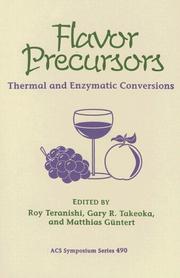| Listing 1 - 2 of 2 |
Sort by
|

ISBN: 0841222223 Year: 1992 Volume: vol 490 Publisher: Washington : American Chemical Society,
Abstract | Keywords | Export | Availability | Bookmark
 Loading...
Loading...Choose an application
- Reference Manager
- EndNote
- RefWorks (Direct export to RefWorks)
Flavor --- Biochemistry --- Food --- Metabolism --- Congresses --- Composition --- Flaveur --- Flavour --- Biosynthèse --- Biosynthesis --- Bioconversion --- bioconversion --- Activité enzymatique --- Enzyme activity --- Traitement thermique --- Heat treatment --- Glycoside --- Glycosides --- Grapes --- Wines --- Fruit --- Lipide --- Lipids --- Réaction chimique --- chemical reactions --- Glucide --- Carbohydrates --- Fumage --- Smoking --- Réaction de maillard --- Maillard reaction --- Cystéine --- Cysteine --- Flavor - Congresses. --- Biochemistry - Congresses. --- Food - Composition - Congresses. --- Metabolism - Congresses. --- bioconversion. --- Cysteine. --- Thiamin --- Limonoid --- Arome de viande --- Deoxyglucosone
Book
ISBN: 3039287893 3039287885 Year: 2020 Publisher: MDPI - Multidisciplinary Digital Publishing Institute
Abstract | Keywords | Export | Availability | Bookmark
 Loading...
Loading...Choose an application
- Reference Manager
- EndNote
- RefWorks (Direct export to RefWorks)
The global biodiversity and climate emergencies demand transformative changes to human activities. For example, food production relies on synthetic, industrial and non-sustainable products for managing pests, weeds and diseases of crops. Sustainable farming requires approaches to managing these agricultural constraints that are more environmentally benign and work with rather than against nature. Increasing pressure on synthetic products has reinvigorated efforts to identify alternative pest management options, including plant-based solutions that are environmentally benign and can be tailored to different farmers’ needs, from commercial to small holder and subsistence farming. Botanical insecticides and pesticidal plants can offer a novel, effective and more sustainable alternative to synthetic products for controlling pests, diseases and weeds. This Special Issue reviews and reports the latest developments in plant-based pesticides from identification of bioactive plant chemicals, mechanisms of activity and validation of their use in horticulture and disease vector control. Other work reports applications in rice weeds, combination biopesticides and how chemistry varies spatially and influences the effectiveness of botanicals in different locations. Three reviews assess wider questions around the potential of plant-based pest management to address the global challenges of new, invasive and established crop pests and as-yet underexploited pesticidal plants.
antifeedant --- encapsulation --- induced systemic response --- corn --- barnyard grass --- rutin --- deguelin --- botanical pesticides --- insect behavior --- organic farming --- aphids --- leaf disc assay --- Melia volkensii --- rotenoids --- botanicals --- entomopathogenic fungi --- anise --- oil emulsion entrapment --- integrated pest management --- sesquiterpene --- botanical pesticide --- pest management --- neem --- insecticidal activity --- insect pest --- insects --- resistance --- biopesticide --- Tetranychus urticae --- karanja --- Colorado potato beetle --- essential oils --- Y-tube olfactometer --- parasitoid --- pests --- chemotype 3 --- limonoid --- prospects --- pyrethrum --- botanical insecticides --- weed control --- cover crops --- agro-ecological intensification --- spatial-temporal variation --- survival analysis --- Senecio fistulosus --- organic pesticide --- synergism --- growth inhibitor --- biopesticides --- tryptophan --- acaricide --- pyrrolizidine alkaloid --- phytotoxic activity --- phenylalanine --- rice --- Meliaceae --- invasive species --- botanical active substances --- structure-activity relationships --- pesticidal plant --- fennel --- spray drying --- foliar fertiliser --- sustainable agriculture --- Italian ryegrass
| Listing 1 - 2 of 2 |
Sort by
|

 Search
Search Feedback
Feedback About UniCat
About UniCat  Help
Help News
News